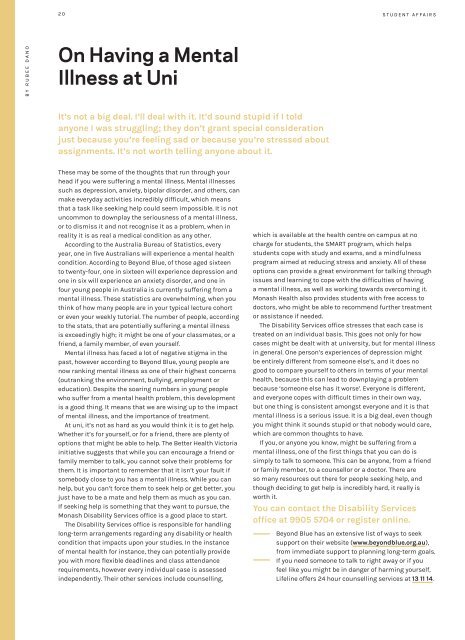Lot's Wife Edition 6 2015
Create successful ePaper yourself
Turn your PDF publications into a flip-book with our unique Google optimized e-Paper software.
20<br />
STUDENT AFFAIRS<br />
By Rubee Dano<br />
On Having a Mental<br />
Illness at Uni<br />
It’s not a big deal. I’ll deal with it. It’d sound stupid if I told<br />
anyone I was struggling; they don’t grant special consideration<br />
just because you’re feeling sad or because you’re stressed about<br />
assignments. It’s not worth telling anyone about it.<br />
These may be some of the thoughts that run through your<br />
head if you were suffering a mental illness. Mental illnesses<br />
such as depression, anxiety, bipolar disorder, and others, can<br />
make everyday activities incredibly difficult, which means<br />
that a task like seeking help could seem impossible. It is not<br />
uncommon to downplay the seriousness of a mental illness,<br />
or to dismiss it and not recognise it as a problem, when in<br />
reality it is as real a medical condition as any other.<br />
According to the Australia Bureau of Statistics, every<br />
year, one in five Australians will experience a mental health<br />
condition. According to Beyond Blue, of those aged sixteen<br />
to twenty-four, one in sixteen will experience depression and<br />
one in six will experience an anxiety disorder, and one in<br />
four young people in Australia is currently suffering from a<br />
mental illness. These statistics are overwhelming, when you<br />
think of how many people are in your typical lecture cohort<br />
or even your weekly tutorial. The number of people, according<br />
to the stats, that are potentially suffering a mental illness<br />
is exceedingly high; it might be one of your classmates, or a<br />
friend, a family member, of even yourself.<br />
Mental illness has faced a lot of negative stigma in the<br />
past, however according to Beyond Blue, young people are<br />
now ranking mental illness as one of their highest concerns<br />
(outranking the environment, bullying, employment or<br />
education). Despite the soaring numbers in young people<br />
who suffer from a mental health problem, this development<br />
is a good thing. It means that we are wising up to the impact<br />
of mental illness, and the importance of treatment.<br />
At uni, it’s not as hard as you would think it is to get help.<br />
Whether it’s for yourself, or for a friend, there are plenty of<br />
options that might be able to help. The Better Health Victoria<br />
initiative suggests that while you can encourage a friend or<br />
family member to talk, you cannot solve their problems for<br />
them. It is important to remember that it isn’t your fault if<br />
somebody close to you has a mental illness. While you can<br />
help, but you can’t force them to seek help or get better, you<br />
just have to be a mate and help them as much as you can.<br />
If seeking help is something that they want to pursue, the<br />
Monash Disability Services office is a good place to start.<br />
The Disability Services office is responsible for handling<br />
long-term arrangements regarding any disability or health<br />
condition that impacts upon your studies. In the instance<br />
of mental health for instance, they can potentially provide<br />
you with more flexible deadlines and class attendance<br />
requirements, however every individual case is assessed<br />
independently. Their other services include counselling,<br />
which is available at the health centre on campus at no<br />
charge for students, the SMART program, which helps<br />
students cope with study and exams, and a mindfulness<br />
program aimed at reducing stress and anxiety. All of these<br />
options can provide a great environment for talking through<br />
issues and learning to cope with the difficulties of having<br />
a mental illness, as well as working towards overcoming it.<br />
Monash Health also provides students with free access to<br />
doctors, who might be able to recommend further treatment<br />
or assistance if needed.<br />
The Disability Services office stresses that each case is<br />
treated on an individual basis. This goes not only for how<br />
cases might be dealt with at university, but for mental illness<br />
in general. One person’s experiences of depression might<br />
be entirely different from someone else’s, and it does no<br />
good to compare yourself to others in terms of your mental<br />
health, because this can lead to downplaying a problem<br />
because ‘someone else has it worse’. Everyone is different,<br />
and everyone copes with difficult times in their own way,<br />
but one thing is consistent amongst everyone and it is that<br />
mental illness is a serious issue. It is a big deal, even though<br />
you might think it sounds stupid or that nobody would care,<br />
which are common thoughts to have.<br />
If you, or anyone you know, might be suffering from a<br />
mental illness, one of the first things that you can do is<br />
simply to talk to someone. This can be anyone, from a friend<br />
or family member, to a counsellor or a doctor. There are<br />
so many resources out there for people seeking help, and<br />
though deciding to get help is incredibly hard, it really is<br />
worth it.<br />
You can contact the Disability Services<br />
office at 9905 5704 or register online.<br />
Beyond Blue has an extensive list of ways to seek<br />
support on their website (www.beyondblue.org.au),<br />
from immediate support to planning long-term goals.<br />
If you need someone to talk to right away or if you<br />
feel like you might be in danger of harming yourself,<br />
Lifeline offers 24 hour counselling services at 13 11 14.

















